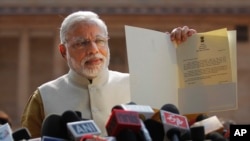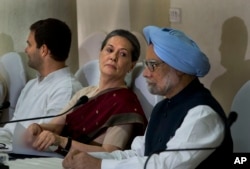NEW DELHI —
Bharatiya Janata Party leader Narendra Modi will be sworn in as India’s next prime minister on May 26. He was called Tuesday to form the next government following his party's landslide victory in national elections. And despite a devastating defeat in the poll, the Congress party has thrown its weight behind the leadership of the Gandhi political dynasty.
The invitation from Indian President Pranab Mukherjee to Narendra Modi to form the next government came just days after the BJP swept India's parliamentary elections.
Tuesday’s meeting in the Indian capital was an emotional moment for Modi, who has risen from a humble background to the highest office in India.
The 63-year-old bowed and kissed the steps of parliament as he entered. He fought back tears as he thanked his party and told lawmakers that the common man has renewed faith and self-confidence in democracy.
He said the clear majority won by the party showed that it was a verdict filled with hope, faith and trust. Modi expressed optimism that the nation was set to march ahead.
Urging party members to dedicate themselves to the nation, he called it an era of responsibility.
Modi pledged to work to uplift the welfare of poor people, youth and women in the country.
He will be sworn into office next Monday, along with members of his Cabinet.
The BJP’s first meeting in parliament after elections was a proud moment for the party which has never won a parliamentary majority, but whose lawmakers now occupy more than half the seats in the powerful lower house.
Party president Rajnath Singh pointed to the achievement.
Singh said for the first time in India, it would be BJP versus all the others.
The BJP has a strong majority unlike coalition governments that have ruled India for the last 25 years. But there are concerns the next government will face no significant opposition in the lower house of parliament after the Congress party’s devastating defeat.
The Congress party, which ruled for the last 10 years, won only 44 seats - less than the 10 percent needed to qualify as the principal opposition in parliament. Even the most pessimistic projections had not forecast such a rout.
Despite the devastating loss, Congress leaders on Monday turned down resignation offers from the party's top leaders Sonia Gandhi and her son Rahul. They called the loss a “collective responsibility” and asked Sonia Gandhi to revamp the party.
In recent days, political observers have raised questions about the ability of Rahul Gandhi, who led Congress’s election campaign, to revive the party. Gandhi is the fourth generation of the Nehru-Gandhi political dynasty, which has given India three prime ministers. He has been called a reluctant politician who could neither measure up to his opponent nor connect to voters.
But political observers say the Congress party’s decision to stick to the leadership of the Gandhis is not surprising in a party that has never allowed other leaders to emerge.
Independent political commentator Ajoy Bose in New Delhi sees troubled times for ahead for a party which has dominated India’s political landscape since independence.
“I think the Congress stands in danger of falling off the political map in India, it’s a far deeper existential crisis than just a defeat. The Congress organization has been dying in many, many areas for now quite a long time, and today having fallen below 50, it could get completely irrelevant,” said Bose.
The Congress party was not the only one decimated. An anti-corruption party, which had made a spectacular debut in Delhi in December failed to make a mark in the national elections, picking up only four seats in the northern Indian state of Punjab. Its leader Arvind Kejriwal admitted that the party needs to build its organization.
For the time being, the fractured opposition gives the BJP and its leader Modi a free hand to govern the country and deliver on promises of economic revival and development.
The invitation from Indian President Pranab Mukherjee to Narendra Modi to form the next government came just days after the BJP swept India's parliamentary elections.
Tuesday’s meeting in the Indian capital was an emotional moment for Modi, who has risen from a humble background to the highest office in India.
The 63-year-old bowed and kissed the steps of parliament as he entered. He fought back tears as he thanked his party and told lawmakers that the common man has renewed faith and self-confidence in democracy.
He said the clear majority won by the party showed that it was a verdict filled with hope, faith and trust. Modi expressed optimism that the nation was set to march ahead.
Urging party members to dedicate themselves to the nation, he called it an era of responsibility.
Modi pledged to work to uplift the welfare of poor people, youth and women in the country.
He will be sworn into office next Monday, along with members of his Cabinet.
The BJP’s first meeting in parliament after elections was a proud moment for the party which has never won a parliamentary majority, but whose lawmakers now occupy more than half the seats in the powerful lower house.
Party president Rajnath Singh pointed to the achievement.
Singh said for the first time in India, it would be BJP versus all the others.
The BJP has a strong majority unlike coalition governments that have ruled India for the last 25 years. But there are concerns the next government will face no significant opposition in the lower house of parliament after the Congress party’s devastating defeat.
The Congress party, which ruled for the last 10 years, won only 44 seats - less than the 10 percent needed to qualify as the principal opposition in parliament. Even the most pessimistic projections had not forecast such a rout.
Despite the devastating loss, Congress leaders on Monday turned down resignation offers from the party's top leaders Sonia Gandhi and her son Rahul. They called the loss a “collective responsibility” and asked Sonia Gandhi to revamp the party.
In recent days, political observers have raised questions about the ability of Rahul Gandhi, who led Congress’s election campaign, to revive the party. Gandhi is the fourth generation of the Nehru-Gandhi political dynasty, which has given India three prime ministers. He has been called a reluctant politician who could neither measure up to his opponent nor connect to voters.
But political observers say the Congress party’s decision to stick to the leadership of the Gandhis is not surprising in a party that has never allowed other leaders to emerge.
Independent political commentator Ajoy Bose in New Delhi sees troubled times for ahead for a party which has dominated India’s political landscape since independence.
“I think the Congress stands in danger of falling off the political map in India, it’s a far deeper existential crisis than just a defeat. The Congress organization has been dying in many, many areas for now quite a long time, and today having fallen below 50, it could get completely irrelevant,” said Bose.
The Congress party was not the only one decimated. An anti-corruption party, which had made a spectacular debut in Delhi in December failed to make a mark in the national elections, picking up only four seats in the northern Indian state of Punjab. Its leader Arvind Kejriwal admitted that the party needs to build its organization.
For the time being, the fractured opposition gives the BJP and its leader Modi a free hand to govern the country and deliver on promises of economic revival and development.













